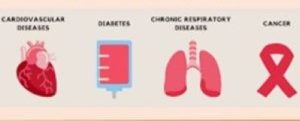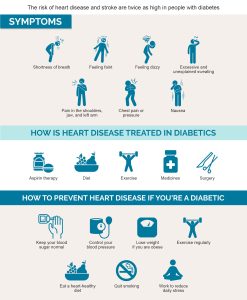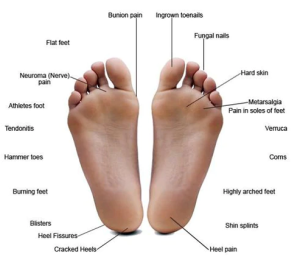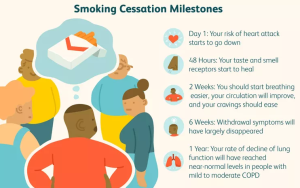In a quiet neighbourhood in the Federal Capital Territory, Mrs. Theresa Emebo, a Police Sergeant, struggles to manage her diabetes. Emebo said every day was a delicate balancing act between insulin doses, diet restrictions, and regular check-ups.
For the mother-of-three who is also the breadwinner of her family, the cost of managing her condition is overwhelming.
“I spend nearly half of my monthly income on medication alone. Sometimes, I have to choose between buying my medicine and feeding my children,” she said.
Emebo’s story is not peculiar. Across the country, millions of people are grappling with the burden of Non Communicable Diseases like diabetes, hypertension, and cancer. These chronic illnesses are not only impacting the health and well-being of individuals but also threatening the socio-economic fabric of the nation.

Beyond individual struggles, healthcare providers and community leaders are also feeling the impact of the growing NCD crisis. Dr. Amaka Ibe, a general practitioner in Lagos State, explained: ”We are seeing more patients with chronic illnesses, particularly diabetes and hypertension, than ever before”.
Ibe said the challenge was not just managing these conditions but also providing continuous care in an already overburdened system.
Community leaders like Mr. Adebayo Ogunleye, who heads a local NGO focused on health education, echoes these concerns. “In many rural areas, people simply do not have access to regular check-ups or affordable medication.
“We are working on outreach programmes to educate people about lifestyle changes that can prevent NCDs, but we need more support from the government and private sector to make a real impact”, he said.

Government policies on NCDs
The Federal Government recently took a significant step in addressing this growing concern by inaugurating four policy documents aimed at curbing the rising burden of NCDs.
These documents were unveiled in Abuja by Prof. Muhammad Ali Pate, the Coordinating Minister of Health and Social Welfare, under the theme, ‘Revitalising NCDs Prevention and Control in Nigeria-Strengthening Multi-sectoral Collaboration.’
The new policies include:
- National Policy for the Prevention and Control of NCDs
- National NCD Task-Shifting and Task-Sharing (NTSTS) Policy
- National Guideline for the Prevention and Management of Hypertension
- National Tobacco Control Strategic Plan of Action (2024-2028).
Additionally, the government introduced a newsletter for People Living with NCDs (PLWNCDs) and the Federal Republic of Nigeria Official Gazette – Fats, Oils, and Food Containing Fats and Oils Regulations 2022.
The growing prevalence of NCDs in Nigeria is driven by risk factors such as unhealthy diets, physical inactivity, tobacco use, and harmful alcohol consumption, as well as hereditary and environmental influences. Pate highlighted that NCDs posed a severe threat to public health in Nigeria.
NCDs often require lifelong management, and the expenses associated with medication, regular check-ups, and hospital visits can quickly drain a family’s resources
He listed them to include cardiovascular diseases, cancers, diabetes, chronic respiratory diseases, sickle cell disease, and mental health disorders, “These conditions account for 27 per cent of all annual deaths in our country, equating to approximately 447,800 lives lost each year,” he said.
NCDs steadily rising in Nigeria -WHO
According to the World Health Organisation (WHO), the prevalence of NCDs in Nigeria has been steadily rising. In 2023, it was estimated that 31 per cent of all deaths in Nigeria were attributable to NCDs, with cardiovascular diseases alone responsible for 12 per cent of the total mortality rate.
The burden of these diseases is not evenly distributed across the country.
A study conducted by Fajola et al (2024) found that 37.6 per cent of adults in riverine communities of the Niger Delta suffer from hypertension, while 3.9 per cent are affected by diabetes mellitus.
NCDs are now the world’s biggest killers, with low- and middle-income countries bearing most of the brunt of these diseases
The study also identified significant predictors of hypertension, including being aged 40 years and above, male gender, and obesity. These findings underscore the urgent need for community-based NCD prevention programmes tailored to these vulnerable populations.
The situation is dire. For people living with diabetes, the rising cost of living has turned essential medications like insulin into an unaffordable luxury.

“Mr. President, the cost of treating diabetes is killing Nigerians. The time to act is now,” said Mr Bernard Enyia, the Vice President of the Diabetes Association, who is one of those fighting this daily battle.
“I was diagnosed in 2008; I depend on insulin to manage my blood sugar levels, injecting myself twice daily. This has taken a toll on my finances. From spending N70,000 a month on insulin and other medical expenses about a year ago, I now spend over N180,000 monthly on treating diabetes,” he narrated.
According to him, this is more than twice Nigeria’s newly approved minimum wage. Majority of the Nigerian population simply cannot afford this.
Dr. Walter Mulombo, WHO Country Representative to Nigeria, highlighted the global and local impact of NCDs during the policy launch.
“NCDs are now the world’s biggest killers, with low- and middle-income countries (LMICs) bearing most of the brunt of these diseases. Each year, 17 million people die from NCDs before the age of 70 years, with an estimated 86 per cent of premature deaths occurring in LMICs,” Mulombo said.
According to him in Nigeria, NCDs are responsible for 29 per cent of all deaths, with cardiovascular diseases accounting for the highest mortality.
He highlighted the critical role the newly introduced documents would play in ongoing efforts to prevent and control NCDs in Nigeria.
“These policies are vital tools in our collective fight against NCDs,” he said, and urged the government to ensure their effective implementation.
Each year, 17 million people die from NCDs before the age of 70, with an estimated 86% of premature deaths occurring in low- and middle-income countries
Mrs. Nanlop Ogbureke, Executive Director, of Resolve to Save Lives, advocated more funding for NCDs. “Over time, infectious diseases have been the main focus, de-escalating NCDs,” Ogbureke explained.
According to her, not much investment, especially funding, has gone into NCDs, making collaboration to contribute to the prevention and control of NCDs in the country very important.
She called for increased collaboration and investment to address the NCD crisis in Nigeria, stressing that without adequate funding and resources, the burden of these diseases will continue to grow.
 Tobacco use
Tobacco use
Tobacco use, a major risk factor for many NCDs, remains a significant challenge in Nigeria. The Chairperson of National Tobacco Control Committee, Dr. Bridget Okoeguale, underscored the importance of robust tobacco control measures as part of the broader strategy to combat NCDs.
“Tobacco use is one of the most significant contributors to NCDs. Effective tobacco control policies, including taxation, public education, and strict regulation, are essential in reducing the burden of these diseases,” Okoeguale said.
She said while Nigeria introduced a N10 per litre tax on Sugar-Sweetened Beverages (SSBs) in 2021, the rate falls short of the WHO recommendation of at least 20 per cent of the retail price.
“A stronger SSB tax policy can generate revenue that can be used to subsidise diabetes treatment and other NCD management, alleviating the financial burden on patients,” she said.
implementing stricter tobacco control measures, such as increasing taxes on tobacco products and enforcing bans on smoking in public places, could significantly reduce the number of new NCD cases
In response to this growing crisis, several community-driven initiatives are emerging across the country. For example, in the North-West region, a grassroots movement known as Healthy Heart, Healthy Life, is working to reduce the incidence of hypertension through regular community screenings and lifestyle education.
The programme, led by local health workers and supported by international NGOs, has already screened over 50,000 individuals and provided free medication to those in need.
Moreover, the government’s recent launch of the National Tobacco Control Strategic Plan of Action (2024–2028) presents a critical opportunity to reduce the burden of NCDs linked to tobacco use.
Experts raised concerns that the strategy should be a living framework that would guide the country’s efforts on the ground. They said that implementing stricter tobacco control measures, such as increasing taxes on tobacco products and enforcing bans on smoking in public places, could significantly reduce the number of new NCD cases in the coming years.
These initiatives, combined with stronger government policies and increased funding, could pave the way for a more sustainable approach to NCD management in Nigeria.
For families like the Ibrahim’s and Enyia’s, the financial strain is immense. NCDs often require lifelong management, and the expenses associated with medication, regular check-ups, and hospital visits can quickly drain a family’s resources.
Beyond the financial toll, NCDs are also taking a significant toll on productivity. Many Nigerians affected by chronic illnesses find it challenging to maintain regular employment.
Fatigue, pain and frequent medical appointments often lead to absenteeism and reduced work performance. This not only affects the individual but also the economy at large as the workforce shrinks and productivity decreases.
By addressing the social determinants of health and focusing on preventive measures, Nigeria can begin to reduce the burden of NCDs. (NANFeatures)


